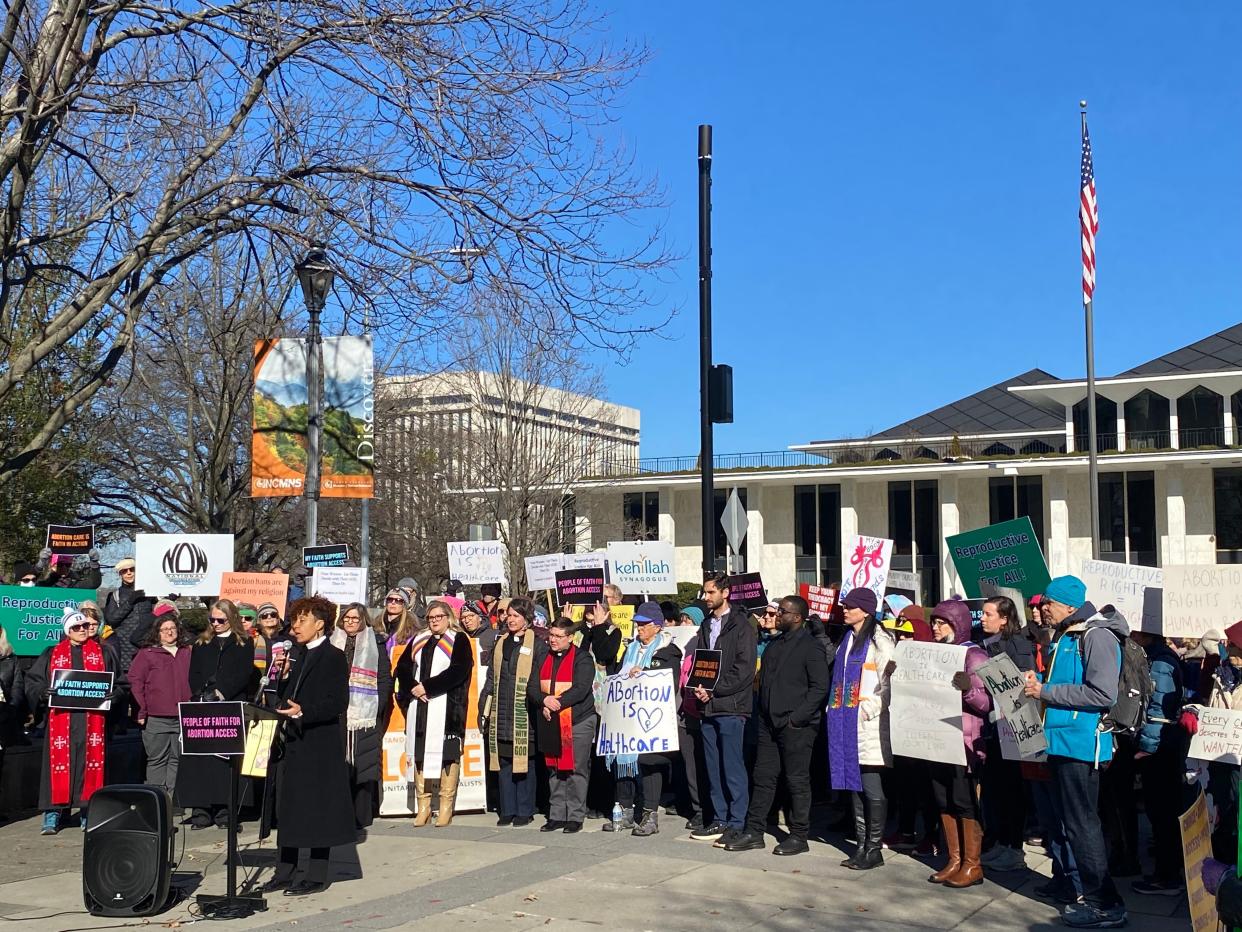On 51st anniversary of Roe v. Wade, NC abortion-rights advocates keep spotlight on issue

RALEIGH – Nine congregations and several reverends filed out of a bus and gathered on a cold Raleigh morning to talk about abortion rights in North Carolina.
But maybe not in the way you would think.
The event, organized by co-founder of the Triangle Interfaith Reproductive Justice Coalition, Melva Fager Okun, was spreading the word that Christians can and do support reproductive healthcare, especially abortion.
Abortion is a divisive topic on the ticket this year in the U.S. presidential debate and for the North Carolina gubernatorial and legislative seats.
According to a Public Policy Polling, “52% of North Carolina voters prefer a governor who supports protecting abortion rights, compared to just 35% who say they prefer a governor who wants to restrict abortion rights.”
Monday marked the 51st anniversary of Roe v. Wade -- the Supreme Court case that protected abortion. The case was recently overturned in the Supreme Court's decision in Dobbs v. Jackson Women's Health Organization, transferring protected abortion access over to individual states.
About 70 Triangle-area reproductive health advocates and people of faith gathered in downtown Raleigh to shed light on what churches believe about abortion.
The nine congregations represented were there to hopefully change the law.
One law the coalition wants gone is North Carolina Senate Bill 20, which when passed, banned abortions after 12 weeks and enacted other restrictions on reproductive healthcare.
The plan to change the law, according to Fager Okun, is to use the power of votes and mobilize congregants who support abortion access.
“We need to change who is sitting in the legislature so that we can return to a state that cares what people feel,” Fager Okun said. “We know they're out of step with even the majority of North Carolinians."
For rally attendee and member of the Triangle Coalition for Reproductive Justice Renee Twersky, abortion is a top consideration casting a ballot.
“It's like when Joe Biden talks about this next election is about democracy,” Twersky said “for me it's about autonomy and empowering women to be full, whole, contributing members of society.”
An uphill battle
Scottie Seawell, member of the Triangle Interfaith Reproductive Justice Coalition and of First Presbyterian Church in Durham, said that “in a state that doesn’t do ballot initiatives that are initiated by people, I think it's a much harder connection to make to the upcoming election.”
The Rev. Lisa Garcia-Sampson of the Unitarian Universalist Justice Ministry of North Carolina said donations to abortion funds and open conversations are integral parts to their support of reproductive rights.
“Churches across the state are contributing to this movement in a lot of different ways,” Garcia-Sampson said. “One is through ongoing fundraising in what we call Share the Plate and fundraising events to support organizations like Carolina Abortion Fund to make sure that we are doing everything we can to support those who have financial barriers to accessing the abortion.”
She also said that churches in the Triangle Interfaith Reproductive Justice Coalition are not shying away from tackling such conversations with their congregants and community members.
Changing the law wasn’t the only goal of this group, though. Shifting people’s perception of what most Christians believe about reproductive rights was also high on the list.
The Rev. Jennifer Ingold Asbill, who pastors at Duke Memorial United Methodist Church, said that not all Christians are anti-abortion.
“Christian beliefs are not universally opposed to abortion and people need to know that,” Ingold Asbill said.
Abortion rights in North Carolina
When Roe v. Wade was overturned in the contentious ruling of Dobbs v. Jackson Women's Health Organization in June 2022, the legality of abortion was given to individual states. Following the decision, the North Carolina legislature passed Senate Bill 20 after overriding Gov. Roy Cooper's veto. This bill bans abortions after 12 weeks.
The Triangle Interfaith Reproductive Justice Coalition was one of several gatherings about abortion on this anniversary. Cooper also spoke about abortion rights in Charlotte, backing Biden's campaign.
Abortion in the presidential race
President Joe Biden and Vice President Kamala Harris were expected to campaign Tuesday in Virginia for reproductive rights. Biden’s team also released a new campaign advertisement called “Force,” which outlines the impacts of a lack of abortion care through the lens of mother and OB-GYN Dr. Austin Dennard.
In contrast, former president Donald Trump has supported anti-abortion policies and he appointed three of the six judges who voted to overturn Roe v. Wade.
Republican presidential candidate Nikki Haley also holds a anit-abortion stance. As South Carolina governor, Haley signed a 20-week abortion ban in 2016. More recently, she has said she is anti-abortion, but believes that politicians need to “stop demonizing this issue. We have to humanize it”
This article originally appeared on Wilmington StarNews: On anniversary of Roe v. Wade, where to NC abortion laws stand

